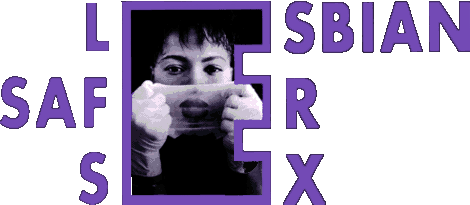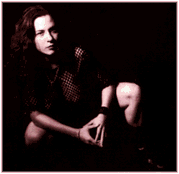January 11, 2004
Are Lesbians At Risk for Contracting HIV from Each Other?

Yes!! There have cases reported since the mid 1980's which indicate that women are transmitting HIV (Human Immunodeficiency Virus) to each other. Despite these reports the Federal Government's Center for Disease Control (CDC) does not include female to female transmission in its AIDS (Acquired Immune Deficiency Syndrome) reports. Many lesbians mistakenly believe that they are not at risk. HIV is transmitted when blood, vaginal fluids, breast milk or semen from an HIV infected person enters your blood stream.
Lesbians can be infected with HIV through having unsafe sex (with women or men), donor insemination, sharing injectable drug works, piercing, tattooing and blood transfusions.
BE AWARE: Drug or alchohol use impairs judgement in many areas including practicing safer sex.
Because we do know how HIV is transmitted we can define some guidelines for safer sex and explain which risky sexual behaviors are
potentially risky.
Whether a sexual behavior is safe or unsafe depends on the chances of your partner's bodily fluids coming in contact with your blood.
- Wet kissing is safer unless either of you have a sore or cut in your mouth or bleeding gums. After you brush your teeth or floss, wait a half an hour before kissing.
- Touching your lover's breast, massage, masturbation and body to body rubbing are safer—as long as there is no blood or breast milk exchanged.
- Sores or cuts on the fingers, mouth or vagina of either partner can increase risk during vaginal and anal contact. Using a glove can prevent a way for the virus to get into your blood stream.
- Unprotected oral sex is risky, especially when your
partner has her period or a vaginal infection. To make it safer,
cover her genital area (vulva) with a latex dam (also known as a
dental dam) or you can cut open a condom to make a barrier. If a
woman is infected, her menstrual blood, vaginal secretions and
ejaculate will have the virus in it. HIV has been found in these
fluids. - Sex toys are safer when used by yourself, but should not be shared without a new condom being put on them.
- S&M or rough sex is safer if there is no blood
involved. If you are piercing each other clean the needle with
bleach. In shaving use separate razors.
Lesbian Safer Sex Guidelines
NOT RISKY
Massage
Hugging
Fantasy
Voyeurism
Exhibitionism
Masturbation (Touching Yourself)
Vibrators or other sex toys (Not shared)
Dry Kissing
Body To Body Rubbing or "Tribadism" when fluids are not involved
POSSIBLY RISKY
Wet (French) Kissing
Shared hand & genital contact with a barrier such as a fingercot, glove, or latex dam (a square piece of latex)
Cunnilingus(Oral-Genital contact) using a barrier
Fisting using a barrier
PROBABLY RISKY
Shared hand, finger & genital contact
with cuts or sores
Cunnilingus (Oral or Tongue to genital contact)
without a barrier
VERY RISKY
Cunnilingus without a barrier during menstruation
Femal or male ejaculate in the mouth, vagina or anus
Rimming without a barrier
Fisting without a barrier such as a glove
Sharing sex toys without a barrier
Sharing needles of any kind, i.e.: to shoot drugs, pierce or tattoo the skin
Drugs, Needles & HIV
If you inject drugs, don't share your equipment ("kit" or
"works"). If you have to share, clean the equipment between use by
flushing the syringe and needle with bleach and water, then flush it
with clean uncontaminated clear water.
If You Are Considering Pregnancy
If you have sex with a man or use donated sperm, make sure he has
two HIV tests six months apart and tested negative both times. The
first test should be six months after his last possible exposure to
HIV. The donor must have no possible exposure to HIV between his last
test and donation. All licensed sperm banks test their donors
carefully and test the sperm twice.
Sex with Men
If you have sex with a man, the man must wear a condom for vaginal
and anal intercourse. Additionally, if you engage in oral sex, it is
necessary that a man wear a condom. HIV is in semen and pre-ejaculate.
If You Think You Are Or Have Been At Risk For HIV Infection
 align=right>
align=right>
If you believe you have been exposed to the HIV virus,
get the HIV test. Early detection leads to early treatment
(intervention) which slows down the progression of the virus. to be
sure of your results, wait 3-6 months after your last risk before
retaking the test.
It is understandible to be scared if you think you might have been
exposed to HIV. Take a calm and realistic look at the risks you might
have taken. Take advantage of the resources we've listed to help you
answer any questions you have regarding risky behaviors.
Regardless of your HIV status you should practice safer sex now to
protect yourself and your parter form HIV and STD's (Sexually
Transmitted Diseases).
Hotlines
Southern California............................(800)922-2437
Bilingual Hotline (English/Spanish)............(800)400-7432
TDD............................................(800)553-2437
Northern California (English/Spanish/Tagalog)..(800)367-2437
TDD............................................(415)864-6606
National AIDS Hotline..........................(800)342-2437
In Spanish.....................................(800)344-7432
TDD............................................(800)243-7889
The Center: L.A. Gay & Lesbian Community Services Center
Art Direction & Production: Deborah Hanan
Photography: Maria Elena Boyd
Models: Jenny/Tina, Robbi/Tracy, Amazon, Nico
Used by permission
Posted by filchyboy at January 11, 2004 09:09 AM
| TrackBack







 align=right>
align=right>